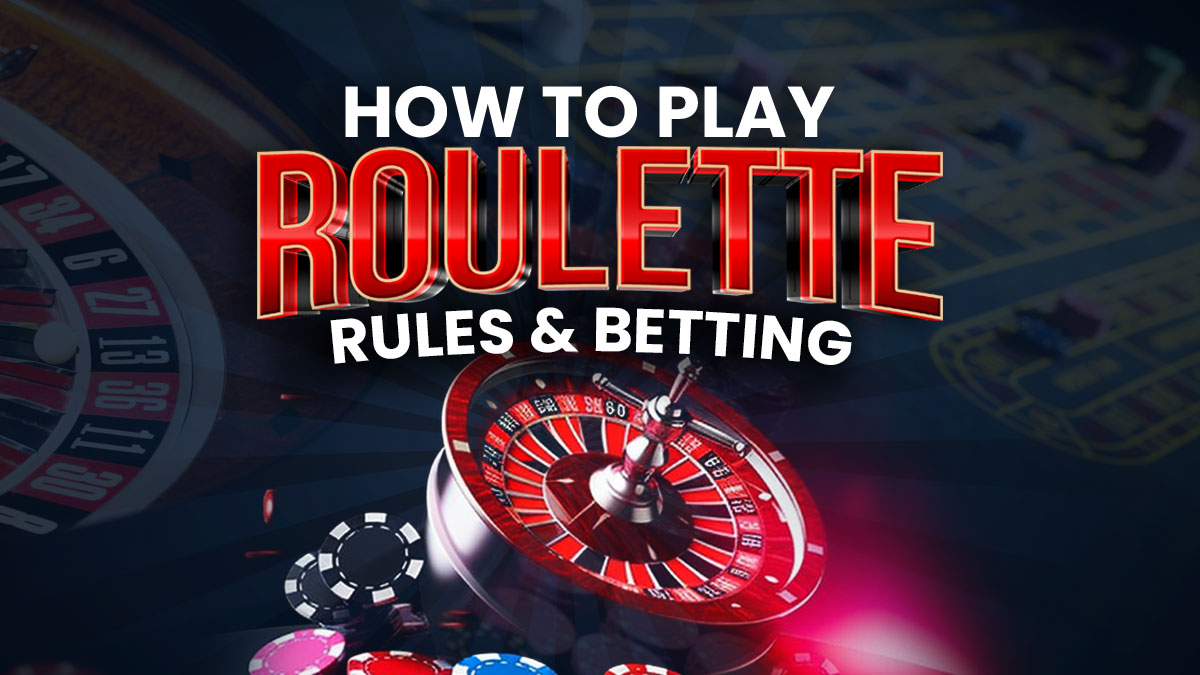
Ever wondered why roulette is such a fan-favorite?
On the surface, it’s one of the simplest casino games in the world — just pick a number between 0 and 36 or place an outside bet on odd/even, black/red, or a group of numbers. Simple, right?
Well, there’s still much more to learn about this legendary game. Whether you’re a newbie eager to know how to play roulette online or an intermediate player looking to boost your bankroll using a dependable roulette strategy, we’ve got you covered!
So before you spin that famous roulette wheel, check out this betting guide highlighting the game’s rules and best strategies.
Before we focus on how to play roulette, let’s cover the basics of this casino game, including the game rules, the outline of a roulette board, and other key features worth highlighting.
The roulette casino game revolves around a wheel with numbered pockets. In European Roulette, numbers go from 0 to 36. American Roulette adds an extra pocket marked 00.
Numbers are not sequential and alternate between black and red, except for 0 (and 00), which are green.
Before each spin, players place their bets, choosing between betting on specific numbers or groups like red/black, even/odd, and grouped numbers. Once all the bets are made, the ball is spun, and the excitement begins.
Roulette games start with players placing bets on a designated area known as the ‘layout,’ divided into inside and outside bets.
Inside bets are directly on one or more numbers. Outside bets are on various number groupings, like odd or even, red or black, high (19-36) or low (1-18).
The croupier spins the wheel and releases a small ball in the opposite direction, and as the wheel slows, the ball lands in one of the pockets, determining the winning bets.
Inside bets in roulette games offer higher payouts but lower odds of winning. For example, a straight-up bet on a single number pays out at 35:1.
Conversely, outside bets have lower payouts but higher probabilities of winning. An even money bet, such as red or black, pays out at 1:1.
French Roulette introduces unique aspects like the ‘En Prison’ and ‘La Partage’ rules. If you’ve placed an even money bet and the ball lands on zero, your bet is ‘imprisoned’ and carried over to the next spin under the ‘En Prison’ rule.
If the next spin is in your favor, you recover your stake; if not, you lose it. With the ‘La Partage’ rule, if the ball lands on zero, you only lose half of your even money bet.
These rules reduce the house edge, enhancing the appeal of French Roulette tables.
While roulette’s outcome is dictated by chance, understanding the odds and payouts can inform your betting decisions, adding a strategic layer to this game of chance.
Besides being simple, roulette is much easier on your wallet than many other casino games. The Return to Player (RTP) rate of some roulette variants is as high as 98.65%, making the roulette wheel one of the highest-payout games at online casinos.
Still, like all casino games, roulette is designed to favor the house in the long run. European Roulette has an RTP (Return to Player) of 97.3%, while American Roulette, with its extra 00 pocket, offers a lower RTP of 94.74%.

Playing roulette is not just about spinning wheels and bouncing balls.
It’s also about the complex betting system that adds depth and intrigue to the gameplay, something you need to consider if you want to master how to win at roulette.
As mentioned, wagers in roulette are broadly categorized into two types: inside bets and outside bets.
Inside bets are placed on specific numbers or a small group of numbers, while outside bets cover larger groups of numbers.
These are the various types of inside bets that players can make when playing roulette:
Two other types of inside bets are the six-line (or double street) bet and the basket bet. The six-line wager covers two adjacent rows of numbers, with a chip placed at the intersection of the two rows.
The basket bet, only available when spinning an American roulette wheel, covers the numbers 0, 00, 1, 2, and 3.
Outside bets encompass larger sets of numbers, and while they offer lower payouts, they provide higher winning probabilities.
The red/black, even/odd, and high/low (1-18 or 19-36) bets are examples of even money outside bets, which pay out at 1:1.
Dozens bets cover twelve numbers (1-12, 13-24, or 25-36), and column bets cover all 12 numbers in any of the three vertical lines. Both these bets offer a payout of 2:1.
While roulette is fundamentally a game of chance, strategic betting can add an extra layer of excitement to online roulette.
For instance, the Martingale strategy involves doubling your bet after each loss so that the first win would recover all previous losses plus a profit equal to the original bet.
Note that every roulette bet carries a house edge. This is the casino’s advantage over the players in the long run, and it varies depending on the type of roulette and the specific bet.
For example, European Roulette has a house edge of 2.7% on all bets, while American Roulette has a higher house edge of 5.26% due to the additional 00 pocket.

There are several variants of the roulette table, each offering a unique spin on the classic game.
As this is a roulette guide, we will discuss the nuances of American, European, and French roulette and explore how they influence the odds and gameplay.
American Roulette stands out with its distinctive wheel featuring an additional pocket marked ’00’ alongside the standard ‘0’ to ’36’.
This seemingly minor addition significantly impacts the game by increasing the house edge to approximately 5.26% on all bets, compared to 2.7% in its European counterpart.
This means that for every $100 wagered, on average, you would lose about $5.26 in American Roulette, as opposed to $2.7 in European Roulette.
The European wheel, with its single-zero outlay, offers better odds to players due to the lower house edge. It also features a simpler layout, making it an excellent choice for beginners.
The presence of only one zero pocket means that the probability of hitting a specific number is 1/37, or approximately 2.70%, creating a more favorable scenario for players compared to the American version.
French Roulette, often considered the original roulette, mirrors European Roulette in terms of the wheel layout but introduces two special rules: ‘En Prison’ and ‘La Partage.’ These rules apply to even-money bets and are invoked when the ball lands on zero.
The ‘En Prison’ rule gives you a second chance. Your bet is ‘imprisoned’ and carried over to the next spin. If your bet wins on the next spin, you get back your original stake; if not, you lose it.
The ‘La Partage’ rule is even more generous. If the ball lands on zero, you only lose half of your even money bet, significantly reducing the house edge to 1.35% on these bets.
Determining the “best” variant depends on your perspective. If you’re a thrill-seeker attracted to high-risk, high-reward scenarios, American Roulette’s higher house edge might appeal to you.
If you’re looking for better odds, though, European and French Roulette are more favorable due to the lower casino’s advantage. Of these, French Roulette offers the best odds.

There are at least two dozen roulette betting strategies out there. While these strategies can’t guarantee a win — the house always maintains its edge — they can add a layer of intrigue to the gameplay.
Let’s delve into some popular roulette betting strategies and their potential pros and cons.
The Martingale is perhaps the most famous roulette betting strategy.
It involves doubling your bet after each loss so that the first win would recover all previous losses plus a profit equal to the original stake.
The D’Alembert roulette strategy is a safer bet progression method. You start with an even chance bet, increasing your bet by one after a loss and decreasing it by one after a win.
The Fibonacci strategy leverages the famous Fibonacci sequence, where each number is the sum of the two preceding ones (1, 1, 2, 3, 5, 8, and so on).
After a loss, you move one step forward in the sequence to determine your next bet. After a win, you move back two steps.
The Labouchère strategy involves writing down a sequence of numbers, where each number represents the betting units.
You bet the sum of the first and last numbers in your sequence. If you win, you cross off those numbers; if you lose, you add the amount lost to the end of your sequence.
The Paroli system is a positive betting progression strategy. In this strategy, you double your bet after each win and return to your original bet after a loss. The goal is to capitalize on winning streaks while minimizing potential losses.
The James Bond strategy involves placing bets on specific numbers and sections of the roulette table based on a fixed betting pattern. The strategy is intended to cover more than half of the possible outcomes, increasing your chances of winning.

To come out ahead in roulette, consider applying a strategy, such as the Fibonacci system, which focuses on 50/50 bets.
Additionally, opting for games with “surrender” or “en prison” rules can enhance your odds.
The ideal online roulette strategy is contingent on your risk appetite.
For instance, the D’Alembert strategy recommends using 1% of your bankroll per bet. Alternatively, high-risk, single-number bets can yield significant returns.
Roulette novices should learn to place bets on predicted ball landings.
As your proficiency develops, explore strategies like the 3Q, which involves betting on vertices and squares.
A 2 to 1 payout in roulette occurs when you bet on a dozen or column, e.g., betting on the ball to land between 1 and 12.
Winning this bet means doubling your original stake plus reclaiming the initial wager.
The safest roulette bets are those with nearly even odds, such as red/black or odd/even.
While these bets have lower payouts, they offer the highest winning probabilities.
For a $1 roulette game, the Martingale strategy is often recommended. Here, after a loss, you double your bet (from $1 to $2, and so on). Conversely, if you win, revert to the base amount.
Another option is the Double-Down strategy, where you start with $1 on a color and double your bet if you lose.
Remember, no roulette gambling strategy guarantees a win — that’s why it’s important to play responsibly at all times.
Yes, you can win real money playing online roulette.
Just like in physical casinos, online roulette games allow you to place bets and potentially win based on where the ball ends up after the dealer spins.
When playing online, remember to opt for licensed, reputable, and regulated online casino sites.
Alright, it’s time to join a roulette table! We hope you learned something new about the roulette game from this article and feel more confident about placing your first wager.
Again, French Roulette tables have the lowest house edge and might be the best option for online wagering.
But take your time to craft that winning roulette strategy and always play responsibly. Never wager more than you can afford to lose, and always have fun!
DISCLAIMER: The information on this site is for entertainment purposes only. You should never gamble to resolve financial difficulties, as nothing is certain.
Do you feel as though you’re approaching problem gambling, or do you know someone with a similar issue? Without further ado, call the National Gambling Helpline at 1-800-522-4700 and seek help. All gambling sites listed in this guide are 21+ only. Check your local laws to ensure online gambling is legal in your area
For free gambling resources, visit:
Executive Bonus Codes For Newsletter Subscribers
Sign Up Now